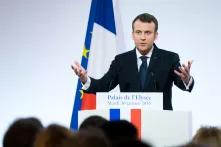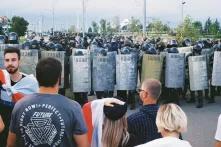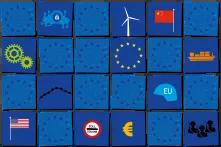The vision of a strategically autonomous Europe is not met with great enthusiasm in Poland and the Baltic states. On the contrary, the preferences between Warsaw, Vilnius, Riga and Tallinn point to a renewal of the transatlantic bond and a stronger NATO in order to contain the challenges represented by Russia and China.

Poland and the Baltic states have developed a cautious stance towards the idea of achieving European strategic autonomy or sovereignty by the European Union. The four countries share the understanding that the EU should do more in foreign, security and defence policy and be more cohesive in other policy areas. However, due to their history and the importance of the relations with the United States to their security Poland and the Baltic states prefer to promote the narrative on the need to reform the West understood as the transatlantic community encompassing NATO and the EU. Within such a renewed West Europe needs to take more responsibility in a close cooperation with the US vis-à-vis the increasing challenge coming from Russia and China.
The West as a Bedrock of Security and Prosperity
Poland and the Baltic states are relative newcomers to the Euro-Atlantic structures - NATO and the EU. Poland has joined the North Atlantic Treaty Organisation in 1999, with the Baltic states following suit in 2004. All countries joined together the European Union in 2004. This has been perceived as their “return” to the West, concluded after the post-war Communist rule and the process of transformation following the fall of the Iron Curtain in 1989. The West was defined as a political, economic and military alliance between the United States and (then Western) Europe. Being part of the West was associated with democracy, stability, prosperity but also with sovereignty and independence. The European integration was meant to be an accelerator of new member states’ socio-economic development, and NATO - with a strong role of the United States - a source of security and an answer to the ever-existing problem with an imperialist Russia. This perception and the notion of the West, that is gradually disappearing from West European discourse, needs to be taken into account when analysing Polish and Baltic perspectives in the discussions on European strategic autonomy or European sovereignty.
The overall conviction in Poland and the Baltic states is that the “golden period” of their peaceful and predictable post-Cold War development has come to an end. The four countries on NATO’s and EU’s eastern flank feel the anxiety coming from the increasingly adverse global and regional environment to a much higher degree than Germany, a country at the heart of Europe. On the one hand, for Poland and the Baltic republics the Russian Federation has become the main source of instability in the eastern neighbourhood. On the other hand, the West, the foundation for region’s stability, is undergoing a transformation process.
From Polish and Baltic view, the outcome of this transformation should be a renewal of the Western community with Europe cooperating closely with the US in a challenging world, where Russia and China exercise their power in an increasingly aggressive manner. This is a mainstream view in all four countries, with their peaceful development being dependent both on the EU and NATO. From region’s perspective the question should be thus about the parameters of the West’s “renewal” and not only about the future on Europe.
Caution Towards European Strategic Autonomy and European Sovereignty
Therefore, the terms European strategic autonomy and European sovereignty are met with an unease in Poland and the Baltic states. The widespread debate in Germany and France on this issue has not reached the Polish or Baltic publics. There have been only a few articles published on the topic, virtually no public or expert events on the issue and government officials omitting this issue.
From the four countries’ perspective “European strategic autonomy” was an ill-devised term from the start. In the Global Strategy of the European Union, it was defined as an autonomy regarding external crisis management. This was a limited definition, contrary to the ordinary understanding of the term, which denotes an emancipation of the EU in political, economic and military terms (from the United States). Such an understanding of the future of the EU is unacceptable for the Poland and the Baltic states, in which close political, economic and military relations with the US are considered as foundations of regional security.
Listening to Paris, which favours European strategic autonomy, the use of this term is not merely a misunderstanding but a reflection of national preferences reflecting the above-mentioned wider definition. Otherwise, French officials would have long embarked for a different narrative. The German option for using “European sovereignty” for taking more responsibility and ability to act on part of the European Union creates confusion as well. Sovereignty is commonly attributed to nations and using it in the European context opens the unproductive debate about the “federalisation” of the EU with different views from the member states.
Moreover, apart from the Germans debating this issue hardly anyone sees the difference in substance between European strategic autonomy and European sovereignty. As two German experts wrote: “Europe has to move beyond toxic debates about “autonomy” or “sovereignty” toward tangible policies”.
More Substance: European Engagement in Security and Defence
More European substance needs to come in the area of security and defence. It is clear to Poland and the Baltic states that NATO should stay the main military alliance that takes care for Europe’s collective defence. At the same time, Europeans should do more, both in terms of investments in their own national armed forces, engagement in collective defence in NATO and in external crisis management in different formats (NATO, EU, UN) as well as in terms of non-military resilience against malign Russian and Chinese influence.
From this perspective recent efforts to increase security and defence cooperation in the EU are welcomed. They should however serve also the security needs of eastern flank states. The EU should engage in military and civilian crisis management through own missions and operations. But it should also contribute to NATO’s collective defence through financial support for military capability development and through projects such as military mobility. This has so far been done to an insufficient extent.
Europeans should use e.g. PESCO and European Defence Fund projects to a larger degree to advance military capabilities that are lacking in NATO, such as air defence or disruptive technologies. A great opportunity to synchronise the EU’s and NATO’s activities in security and defence will be the development of strategic documents in both organisations that will take place in the coming two years. From Polish and Baltic perspective, it should be a priority to harmonise the goals and means of EU’s Strategic Compass and NATO’s Strategic Concept.
But this is not enough. European allies should do more also within NATO. The US shift of focus to Asia-Pacific will have consequences. US military engagement in the European security will not be guaranteed to the extent it used to be in the past. More European, including more substantial German engagement on the eastern flank needs to come either through NATO or regional cooperation formats, ideally in collaboration with US forces in the region.
“Sovereignty” for All EU Member States
The Polish and Baltic concerns about European strategic autonomy or European sovereignty do not relate to security and defence only. The worry is also about the balance of power in the post-Brexit EU and about the representation of the interests of all member states. The four countries have concerns that under the umbrella of narratives about European “autonomy” or “sovereignty” French and German interests will be at the forefront of EU’s agenda with smaller and medium-sized EU member states being side-lined.
This is because Brexit has changed the political configuration of the EU. Poland and the Baltic states have lost an important ally balancing the Franco-German tandem. The United Kingdom shared with the region similar approaches to many policy areas including transatlantic relations, Russia, European security, the internal market, the common currency and trade. Since 2016 the Franco-German relationship in the EU has been strengthened. Even if France and Germany do not share the same vision on the future of the European Union and follow different national interests, a compromise in concrete policies is increasingly shaped somewhere in the middle ground between Berlin and Paris.
The position of Poland, a middle-sized member state, and of the three small Baltic states, has thus become increasingly challenging. In these countries the European autonomy or sovereignty is partly perceived as a buzzword for promoting Franco-German undertakings in the EU, in which mainly or solely the two countries were involved. Creating “European” champions, starting “European” armaments programs, introducing more protectionism on the internal market, proposing qualified majority voting in foreign and security policy along with adaptations in other policy areas - all this has been proposed without region’s involvement and was met with an unease for the reasons mentioned.
Therefore, a more inclusive approach on the part of France and Germany in the debates and actions on “more Europe” is needed. Excluding Polish and Baltic states’ perspective and interests that are to a large degree shared also by the Nordic and the V4 countries might be counterproductive for the intra-EU debate.


